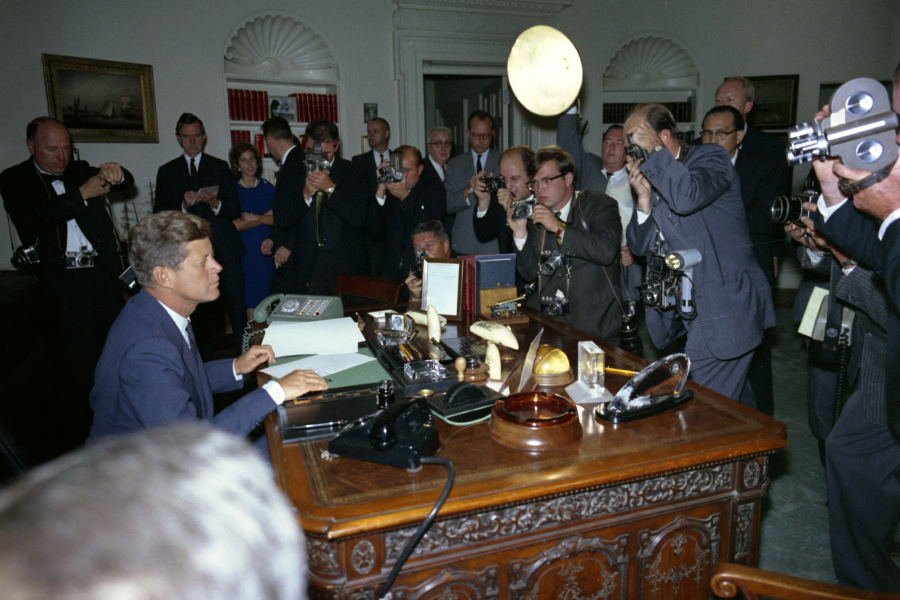Don’t Be So Confident in Nuclear Decision-Making
The risks of brinkmanship look greater when research on human psychology is taken into account.

Published by The Lawfare Institute
in Cooperation With

Editor’s Note: The Russian invasion of Ukraine brought with it the specter of nuclear conflict—and that was not by chance. Drawing on their longer article in International Security, Reid Pauly and Rose McDermott of Brown University argue that states have many reasons to engage in nuclear brinkmanship. However, Pauly and McDermott warn that things can easily get out of control and that individual and small group psychology, not cold reason, may prove most important during crises.
Daniel Byman
***
Vladimir Putin’s threats of nuclear escalation in Ukraine have justifiably raised concerns about the likelihood that he would actually use nuclear weapons in his failing war of aggression. They have also raised questions about the extent to which Putin may be bluffing, trying to use nuclear blackmail to garner concessions in a war that has not gone nearly as well as he had expected. Nuclear brinkmanship has a long history, with thankfully little empirical evidence on the consequences of the actual use of nuclear weapons in war. Where some see bluffs, others see resolve; even in retrospect, it is difficult to know who is correct. Yet beyond these important assessments of threat credibility and strategy under the nuclear shadow lies a terrifying and an even murkier path to nuclear war: human psychology. Leaders are human, after all, and humans cannot always be counted on to make rational decisions.
In a recent article published in International Security on the psychology of nuclear brinkmanship (kindly ungated by MIT Press), we explored how leaders can try to leverage chance events to their advantage during times of crisis. Building on Thomas Schelling’s famous argument about “threats that leave something to chance,” we brought together findings from decades of research on human psychological biases to examine the pathways through which leaders can wind up irrationally creating more risk of escalation than the stakes are worth: accidents, losing self-control, and faulty control over others.
The logic of nuclear brinkmanship states that even if a leader would have to be irrational to start a strategic nuclear war, they do not have to be irrational to risk one. Stomaching the risk of escalation can convince the other side to back down. This was, indeed, a genius insight that helped Schelling to win a Nobel Prize in economics. But since Schelling’s work, decades of social science have proved how bounded human rationality actually is, and it is now an idea in need of an update. Psychological factors explain how brinkmanship can operate even when leaders retain control over their nuclear forces and agency over the choice about what to do with them. Emotions and psychological biases might play a more decisive role than previously recognized in how chance and choice coexist in nuclear crises. These factors also make nuclear war more likely than are appreciated in the rational cost-benefit assumptions that undergird deterrence theory.
Though it may seem desirable to keep one’s military under tight control in a crisis, some leaders are more willing to risk disaster in order to get what they want. To engage in brinkmanship, they can make nuclear threats, alert their nuclear forces, operate them in close proximity to the enemy, or approve tactics that court accident, such as “buzzing” adversary airplanes. Crucially, while accepting these risks and their potential consequences, leaders still retain agency over crisis decision-making and how to respond when accidents or attacks do happen. It is these choices, especially in stressful times of crisis and war, that can be influenced, perhaps decisively, by individual psychology and emotional states.
Some psychological responses are fairly universal because of their roots in evolutionary psychology. The desire to retaliate in the face of attack appears to be one of those common patterns of response. Nuclear brinkmanship seeks to exploit this central contradiction in nuclear deterrence theory: While it might appear irrational to launch or retaliate against a nuclear armed rival, few doubt that the desire for revenge would spark just such an action in the face of a strategic nuclear attack. Other aspects of psychology are much more individual and can encompass such factors as the way the person was raised, biases they may hold against other groups and people, and even specific pathologies, such as alcoholism. Current emotional states can be hugely affected by forces as transient as sleep. All of these factors can contribute to individual differences in responses to threat, risk, and opportunity. And these individual differences exist in the larger structural context of nuclear deterrence.
The psychology and emotions of decision-makers matter in a crisis because they introduce an element of individual difference that may not be easily captured by looking at averages. Some leaders see risk where others see opportunity, and some are more willing to risk catastrophic consequences. Moreover, individuals differ enormously in their ability to accurately recognize emotions in others and, thus, accurately interpret who might fight and who might back down. They also vary even more in their ability to manage and regulate their own emotions in the context of loss, threat, or frustration. Leaders such as Putin may be rare, but those who emerge prove enormously consequential.
Particularly when the authority to launch nuclear weapons rests in the hands of a single leader (as in the United States) or a very small group of leaders (as in Russia), individual differences in impulsivity, narcissism, or risk-taking can exert a decisive difference in responses to threat. Both sides in a crisis may fail to understand the true meanings of the signals they receive and not comprehend the ways that the signals they send may be misperceived by the other side. Uncertainty can compound as each side interprets the same information in different ways. Fear and anger can induce leaders to take risks they might not have if they had more time to consider their options, were not acting under the pressures of crisis or threat, or did not have to be concerned about domestic and international reactions.
Incorporating a more psychological pers pective into analyses of nuclear brinkmanship suggests that revisions to existing policies and approaches to nuclear risk reduction may be in order. For instance, traditional arms control treaties and other risk reduction mechanisms are undoubtedly valuable when they make material changes to nuclear warheads and delivery vehicles that can reinforce deterrence or reduce the tyranny of haste in a nuclear crisis. But disrupting irrational processes requires more than just buying time—it matters what decision-makers do with that time. The most valuable use of that time would involve checking their emotions and biases. This can be improved, most simply, by requiring more than one person to agree before authorizing the use of nuclear weapons. Dedicated procedures and protocols for decision-making based on those successfully implemented in other fields, such as medicine, could also be developed and implemented to help reduce common biases. Launch officers must follow checklists, but political leaders do not. We suggest that should change.
The past few years should make clear to all observers the outsized role of individuals in the conduct of foreign policy. We all share common intuitions about the circumstances that tend to make even our friends react with fury, if not violence: when they are frustrated, when they are backed into a corner and do not see any way out, when they are tired or hungry or scared, when they are lonely and feeling isolated. Similarly imperfect human decision-making remains a crucial part of nuclear brinkmanship. Yet, if we know what circumstances are most likely to generate alarm, we can begin to work toward ways to increase the likelihood that the choices leaders make in such situations create less chance and more control.






